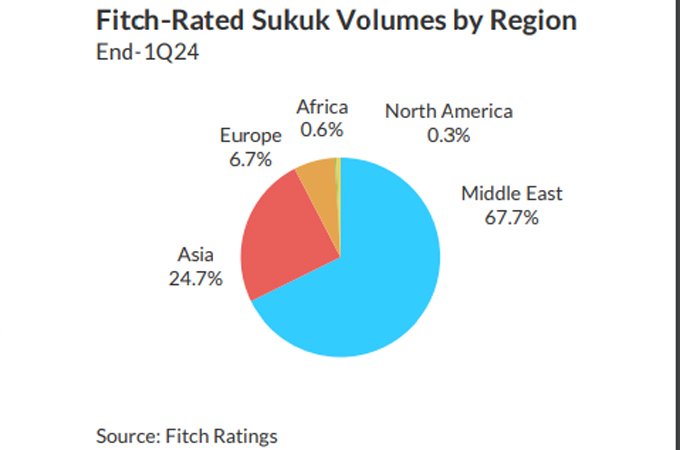
Sukuk market set to grow; GCC DCM to cross $1 trillion
DUBAI, April 17, 2024
Sukuks are expected to grow further through the remainder of 2024 – albeit slowed from 1Q24 – and the GCC debt capital market (DCM) is well on its way to cross $1 trillion outstanding, says a Fitch Ratings report.
The upgrades of Qatar and Turkiye have been ratings-positive for sukuk in these countries, it said. Fitch rates about $185 billion of sukuk outstanding, around 80% of which are investment-grade.
The share of sukuk issuers with a Positive Outlook expanded to 8% in 1Q24 (4Q23: 3.6%), and there were no notable sukuk defaults, it added.
Sukuks are expected to grow due to funding and refinancing needs, diversification and debt capital market (DCM) development goals, and lower rates. Risks include new sharia requirements that could alter sukuk credit risk, geopolitical uncertainties, and high oil prices.
“Around 80% of GCC sukuk is now investment-grade, and the GCC DCM is well on its way to crossing $1 trillion outstanding,” said Bashar Al Natoor, Global Head of Islamic Finance at Fitch Ratings.
“Saudi Arabia, UAE and Malaysia will likely stay among the most active sukuk issuers.”
Malaysia is still the largest sukuk market globally, with around 60% of its ringgit DCM in sukuk.
GCC countries account for 35% of global outstanding sukuk. GCC DCM reached $940 billion outstanding (sukuk share: 37%) at end-1Q24. GCC banks issued more US dollar debt (sukuk share: 51%) in 1Q24 than in full-year 2023. Corporates and projects will likely stay reliant on bank funding, but the government push to develop the DCM, and reduce bank reliance, could drive sukuk issuance.
Global outstanding sukuk expanded 10% yoy, to $867 billion at end-1Q24. The GCC, Malaysia, Indonesia, Turkiye, and Pakistan (including multilaterals) issued similar levels of sukuk over 1Q24, totalling USD56.8 billion (all currencies). Bond issuance fell 24.3%.
The AAOIFI draft Sharia Standard No. 62 may allude to altering the credit profile of sukuk from asset-based to asset-backed, among other areas. Fitch generally assesses the impact of AAOIFI standards on a case-by-case basis, as actual adoption, implementation, and interpretation could vary significantly between regulators and institutions, the report said. -TradeArabia News Service








